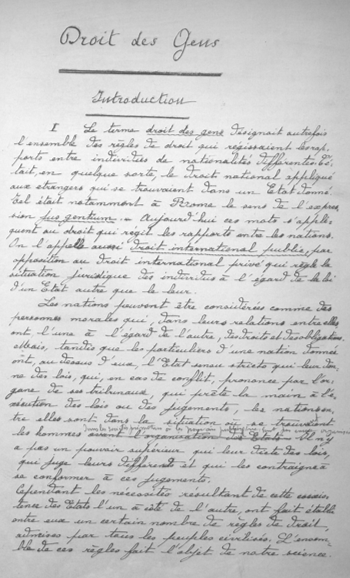This event is a presentation of 175 pages of manuscript course notes on the law of nations (Le droit des gens) linked to a course taught at the Belgian Ministry of Foreign Affairs in the Belle Époque, retrieved in Louis (Léon) Arendt's private papers in the Belgian State Archives (Fund BE-A0510.320). The inventory can be consulted on the State Archives' website.
Edouard Louis Léon Marie Arendt (1843-1924) was the director-general of political affairs (1886) in the Belgian Foreign Office in the heyday of King Leopold II's reign. He entered the Ministry as 'attaché' in 1870. Belgium's security on the European continent, and of course the affairs of the Congo Free State were the dominant themes of his time in office as a civil servant (1870-1912).
Biographical details can be found in the entry by Jacques Willequet in the Biographie nationale de Belgique. His father, Academy member and Professor at the Catholic University of Leuven Wilhelm Arendt (1808-1865) authored a seminal treatise on Belgian permanent neutrality in 1845. The text can be consulted on Google Books.
Louis Arendt authored 'hundreds' of legal memoranda elaborating the theory and practice of Belgian permanent neutrality. For an introduction to the topic. Henri Haag devoted a lenghthy article to Arendt's memorandum written in 1911 and its use on the eve of World War One (Bulletin of the Royal Commission for History, open access on Persée).
Arendt provided a hand-written 'Préface' on the left-hand side of the first page, stating:
Jusqu'à la page 82 (lois de la guerre) ce cours a été copié, sous révision préalable, sur un cahier déjà ancien d'un élève peu rigoureux. D'où des fautes, des vieilleries, des phrases incorrectes. La suite elle-même n'a subi aucune correction, mais a été donnée à mes chers élèves. 3 septembre 1904. Tiré à 9 exemplaires.
The purpose of this OSF-site is not to provide a full-fledged analysis of Arendt's treatise. That is the subject of research articles and chapters. The current wiki shares the text in a transcription as it can be found in the State Archives. We did not interpolate (i.e. errors in the text are indicated with [sic]), since most the French grammar and vocabulary used in 1904 largely conforms to what we use nowadays.
My oral contribution at the conference "Law(s) and International Relations", held in Orléans (15-17 Sept 2021) can provide a glimpse of the richness of this source.
This event is hybrid: participants can either go physically to the Faculty of Law's Council Room, or register for the Teams-event here.

Geen opmerkingen:
Een reactie posten